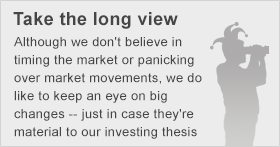
Initial claims for U.S. unemployment benefits fell by 10,000 last week to a better-than-expected 311,000 -- the lowest level in four months. A weekly number is high-frequency data by the standards of macroeconomic data, but the four-week moving average has also fallen to a six-month low. That ought to boost investor confidence that the job market is improving, but it's not enough to carry U.S. stocks higher this morning, apparently. The benchmark S&P 500 and the narrower Dow Jones Industrial Average (^DJI +0.48%) were down 0.06% and 0.01%, respectively, as of 10:20 a.m. EDT. In today's headlines, the Federal Reserve has rejected Citigroup's (C +0.73%) capital return program outright, while requiring competitor Bank of America (BAC 2.04%) to scale down its plan.

As yesterday's after-hours action suggested, the market is not taking kindly to the news that the Fed has blocked Citigroup's capital return plan on "qualitative concerns" (as announced with the results of major banks' annual stress test last week, Citigroup met the Fed's quantitative criteria for minimum capital requirements.) Shares of Citigroup were down 4.2% at 10:20 a.m. EDT.
The Fed did not specify the nature of its concerns regarding Citi, but it lists four general qualitative grounds for rejecting a capital plan on page 19 of the report of its stress test results [opens a PDF document]. They include, for example, a situation in which "a BHC's [bank holding company's] capital adequacy process or proposed capital distributions would constitute an unsafe or unsound practice."
The Fed's decision is an embarrassing setback for Citigroup CEO Michael Corbat, who stepped into the top job in October 2012 to jump-start the banking behemoth's turnaround. It suggests the organization has not made as much as progress as investors -- and Citi's executive management -- believed. Nevertheless, the decision has minimal direct financial impact for long-term shareholders, and with shares trading at roughly a 10% discount to their tangible book value, I think there is a good case for looking at the stock now.
Meanwhile, Citi's closest rival, Bank of America, is getting a 1.3% boost from the Fed's approval of its (adjusted) capital plan. For over three years, the bank had been paying out a token penny-a-share quarterly dividend, but that will now rise to $0.05 per share. On an annualized basis, the raised payout equates to a 1.2% dividend yield, based on yesterday's closing price. That remains inadequate by historical standards, but the increase is a welcome signal of better days ahead.
In addition to the dividend hike, Bank of America also announced yesterday a new $4 billion share repurchase authorization. Finally, the bank announced separately that it has reached a $9.5 billion settlement with the Federal Housing Finance Agency -- the conservator of Fannie Mae and Freddie Mac -- regarding the misrepresentation of mortgage loans. The settlement will wipe out three-fourths of the $0.28 that analysts expected BofA to earn in the current quarter, but it means the bank has now resolved nearly nine-tenths of the principal balance of all residential mortgage-backed securities that represent a litigation exposure. The light at the end of the tunnel is in sight -- no wonder investors are cheering the stock this morning.
